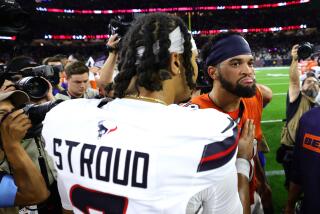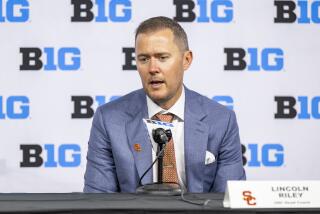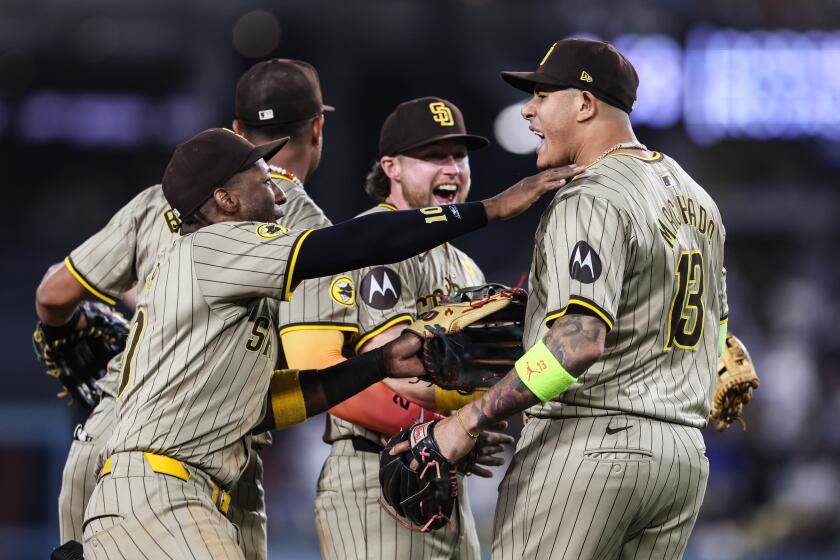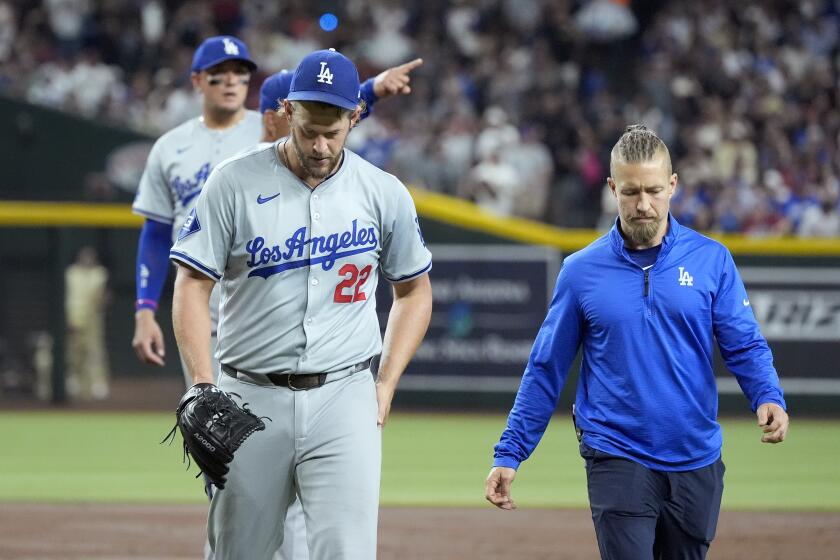Don’t let the Saints off the hook in bounty scandal
Gregg Williams is in big trouble. The former New Orleans defensive coordinator, a guy who answered to the self-styled nickname “Dr. Heat,” is at the middle of the bounty scandal that has rocked the Saints.
At the moment it’s the biggest story in the NFL, big enough even to supplant the Peyton Manning saga, which hinges on Thursday’s roster bonus deadline. (Former Colts coach Tony Dungy, incidentally, thinks there could have been a bounty on Manning in 2006 when Indianapolis played Washington, where Williams was the defensive coordinator. In that game, Redskins then-defensive end Phillip Daniels — who has admitted to a bounty system there — clobbered Manning with a hit that is believed to be the start of the quarterback’s chronic neck problems.)
Williams, now defensive coordinator in St. Louis, figures to get the most severe punishment for the Saints fiasco, especially because he evidently has a pattern of installing these systems with teams, one that rewards defenders with cash for knocking opponents out of games. He met Monday with NFL security officials.
But say this for the prime culprit: Shortly after the league released the findings of its secret investigation of the Saints, Williams publicly admitted he was involved, said he knew it was wrong all along and apologized. The league probably had his fingerprints all over the scandal, but at least Williams confessed.
It will be shameful if the rest of the Saints wriggle off the hook by throwing Williams under the parade float. Clearly, the bounties were part of their team culture, and it’s entirely illogical to think they happened without the knowledge of Coach Sean Payton and General Manager Mickey Loomis. They have to be held accountable too, and that probably means weighty suspensions.
There’s no question the tension was thick between Payton and Williams, both of whom considered themselves head coaches. On their best days, their working relationship was professional. Mostly, it was strained. Williams could be engaging and entertaining with the media, told good stories and sometimes talked too much. That had to bother Payton.
Two years ago, on the morning of Super Bowl media day, Payton had a waiter bring Williams a plate of crackers and peanut butter, along with a glass filled with sand, a none-too-subtle reminder for the defensive coordinator to keep his mouth gummed shut. Usually, the back-and-forth didn’t have as playful a feel.
Regardless, the Saints knew what they were getting in Williams, and he frequently talked about his directive to toughen up a defense that had gone soft.
“That was why [Payton] hired me,” Williams told The Times in September 2010. “He wanted that attitude on defense.”
In the same interview, Williams talked with pride about the toughening-up of safety Darren Sharper, who last week said the bounties were only for big plays and called “ridiculous” the suggestion there was any payout for knockouts or cart-offs of opposing players.
“The thing I’m most proud of is, Darren Sharper in the last three years of his career wouldn’t hit the water if he fell out of a boat,” Williams said before the 2010 opener against Minnesota. “Last year, he might have been one of the biggest impact hitters on our team. He had more big hits — what we call smacks — than anybody on our team.”
It isn’t as if the topic of the Saints’ going overboard in the way they hit Brett Favre in the 2009 season’s NFC championship game is something new to the NFL investigation. Then-Vikings coach Brad Childress had it on his mind before that 2010 opener in New Orleans.
“I understand a quarterback’s going to get hit,” Childress said at the time. “It’s football. I don’t have any illusions about that. What I hate to see are the late hits or attempts to hurt anybody. I don’t think there’s a place for that in the game.”
The Saints knew what people were saying. They knew their tactics were under scrutiny. It wasn’t just a rogue defensive coordinator. Payton and Williams had their differences, but the meticulous head coach was not out of touch with what was happening on the defensive side of the ball.
Although the report said Payton was not a direct participant in the funding or administration of the program, “he was aware of the allegations, did not make any detailed inquiry or otherwise seek to learn the facts, and failed to stop the bounty program.
Further, it said, Payton “never instructed his assistant coaches or players that a bounty program was improper and could not continue.”
NFL security has forensics experts who surely have studied the email trail, and more will be brought to light in the coming days. There almost surely will be heavy fines, suspensions and maybe the loss of draft picks.
The league should nullify Williams’ contract in St. Louis and suspend him for at least two years, and suspend Payton and Loomis for at least half a season if not the entire year. What’s more, the NFL should also reduce the Saints’ salary-cap limit by 10% for a year or two — also reducing the Redskins’ cap by, say, 5% — then require those franchises to donate that unused money to a fund for retired players.
The NFL has made player safety a focus for at least the last two years. This is a chance for the league and the players’ union to work together and send a message that they won’t tolerate bounties aimed at injuring opponents.
Yes, Dr. Heat will get much of the blame. But he shouldn’t be the only one feeling the flames.
twitter.com/LATimesfarmer
More to Read
Go beyond the scoreboard
Get the latest on L.A.'s teams in the daily Sports Report newsletter.
You may occasionally receive promotional content from the Los Angeles Times.











